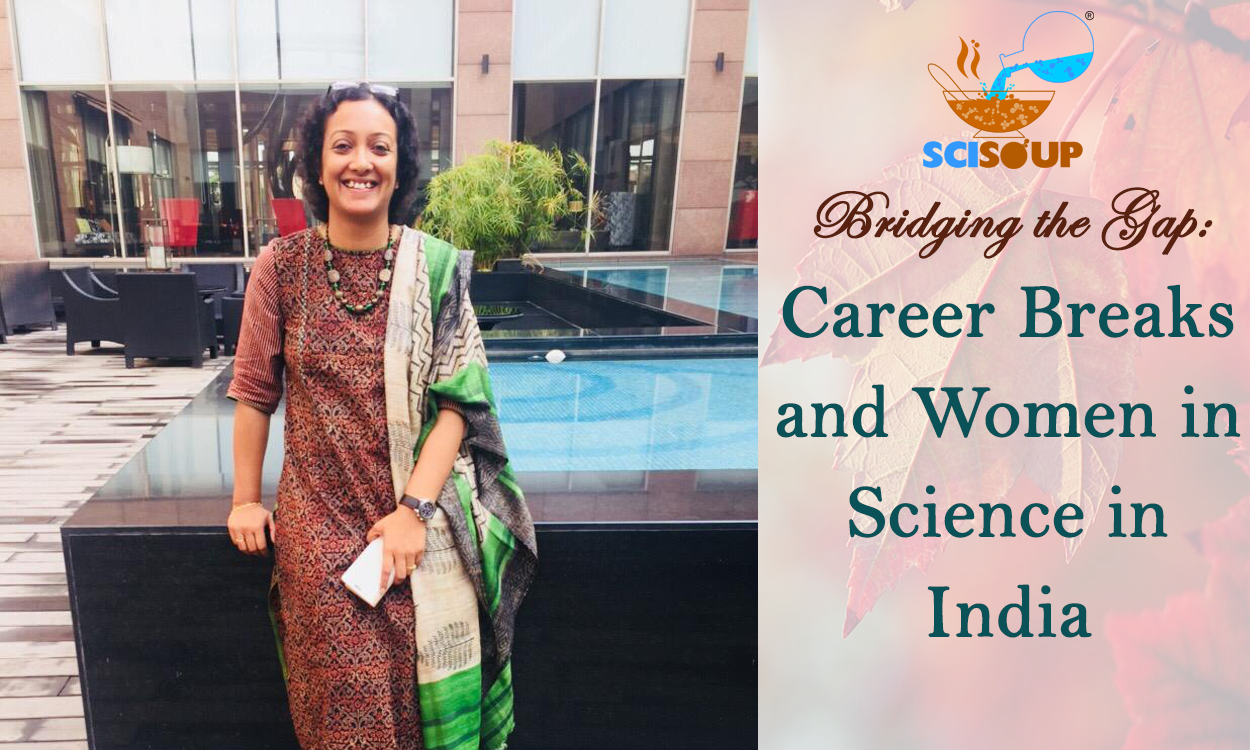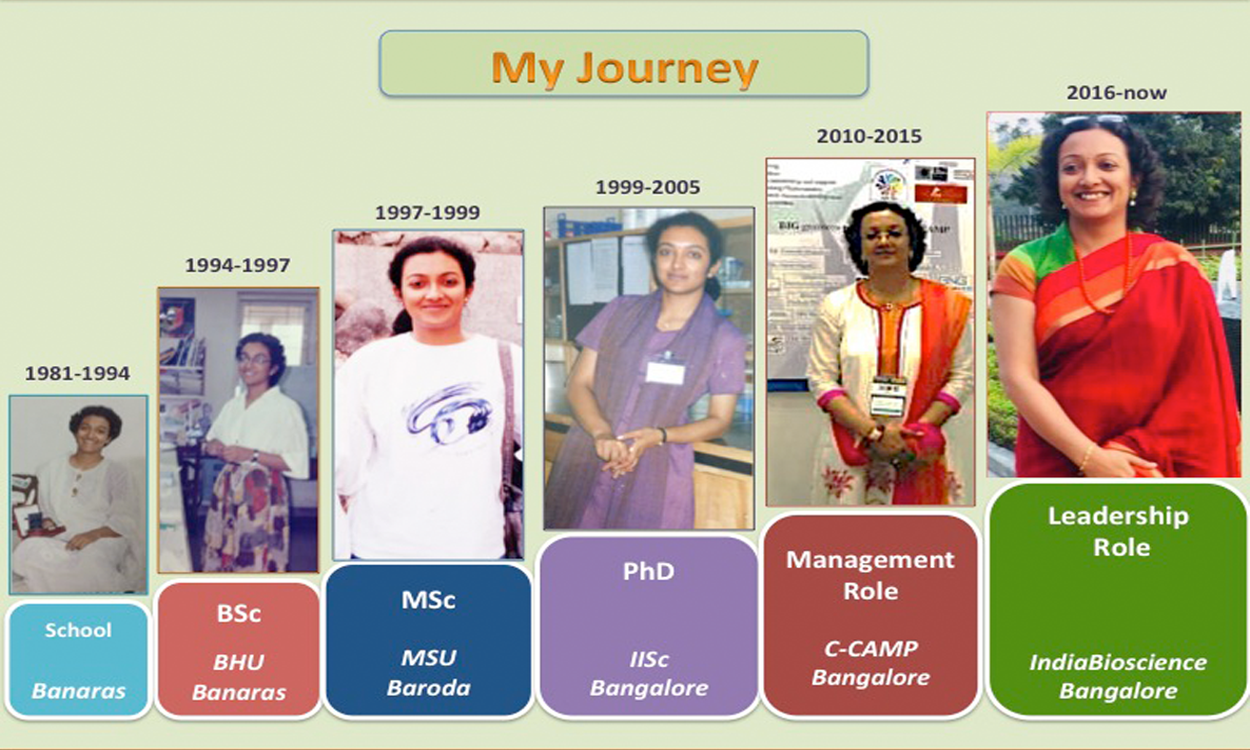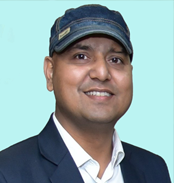
The purpose of this blog series is to share the experiences of women in science in India who have returned to the workforce after career breaks (‘comeback queens’), and translate their personal experiences into suggestions for policy and administrative implementations. In doing so, we believe that this series will highlight these inspirational stories, and provide role models to several women who are currently in career breaks or returning to the workforce. In addition, we intend, through these relatable, real-life examples, to send out a strong message to young women (students, researchers) in Indian science, that a balance between personal and professional goals can indeed be achieved. For this series, we have not adopted any definition of a career break, it can be as less as 1 year, to as long as 20 years or anywhere in between, and the reasons could vary from personal, family, health or simply time off. Further, the return to the workforce is very broadly defined, to include return to academia, industry, policy, management, communication, entrepreneurship or others.
SEP 06, 2020 | By Karishma S Kaushik , Ratneshwar Thakur
In our first blog of the series, we highlight the inspirational story of Dr. Smita Jain, Executive Director, IndiaBioscience, India’s foremost life science outreach organization. While Smita is a well-known figure in Indian science for her administrative and outreach roles, her career break story is largely unknown. This is a story that needs to be shared!
Tell us about your professional journey in STEM.
After a bachelor’s degree from Banaras Hindu University, Banaras, a master’s degree in Biotechnology from Maharaja Saiyajirao University, Baroda and a Ph.D. in Cancer Biology from Indian Institute of Science (IISc), Bangalore (2006), I was at the crossroads of making a career choice. I married during my Ph.D. and also had my first baby during this academic phase. Looking back, it was my drive and passion, coupled with a supportive ecosystem (mentor, lab mates, and family), that enabled the completion of my Ph.D. While I succeeded a demanding academic phase, it became clear to me that a long-term academic career was possibly not the best fit for my personality. Understanding this, I resisted the popular trend of applying for postdoctoral research positions, and instead joined a biotech-based industry. Although I was convinced that academia is not for me, I was not sure what exactly I want to do for my career. Here, the support of my parents (especially my father who is an academic himself) was crucial.

What made you prioritize a career break?
After a three-year-long stint in the research and development side of the industry, where I learnt a whole new set of organizational skills and professionalism, I moved to another organization as a product specialist. It was my dream career back then in 2008; I knew that I would be using my scientific knowledge and interpersonal skills, and would also get to travel. However, the start of my new role coincided with my second pregnancy, and unanticipated medical issues threw things out of gear. With a home, a four-year-old, and a pregnancy to manage alongside ill-health conditions, I chose to quit in a short span of time. Further, the birth of my second baby coincided with life-threatening medical conditions, which made me prioritize a career break. Instead of worrying about the path ahead, I decided to spend some quality time with myself and with my two little ones. I strongly believe that it is the responsibility of the parents to give that quality time to their children, especially during those early formative years. As a parent, these two years gave me the time to enjoy my kids, and nurture them towards becoming responsible and independent individuals.
How was the experience of returning to the workforce?
After spending two-long years off from active work, I started looking for opportunities that were away from the bench. I was particularly interested in a science career that tilted towards research administration and management. In 2010, I was introduced to Centre for Cellular and Molecular Platforms (C-CAMP), then a newly established organization. They were looking for an individual with a degree in science to join their business development team. I found this role to be the right fit for my skills, interests, and values, and I joined C-CAMP as a business development manager. However, this time around, I negotiated flexible working hours, clearly stating why is it important for me, and how I would manage my work. The management at C-CAMP supported this, and my journey into the field of scientific administration and management started. The stint at C-CAMP not only expanded my professional skill sets, but also helped me grow my network across the country, and learn the tricks and trades of science management. I was thoroughly enjoying my role when my husband had to shift his base within the country due to a change of project. I chose to put down my papers at C-CAMP. However, the mutual trust and confidence established by that point resulted in the management giving me an opportunity to work from home from the remote location. I worked remotely for the next three years.
What were the major challenges, and how did you overcome it?
However, with remote working, the major challenge that came by my way was the need to travel across the country for meetings and conferences or to Bangalore. This involved travel for a couple of days or sometimes, even weeks at times, which was challenging with two small children at home. I handled it with a simple chat with my children, sharing the importance of my career and the need to travel; they very graciously understood, became progressively accommodative of my work demands, and helped out at home. The constant support I got from my husband was also very important in this stage of my career.
Working from home for a mother of two is not easy, and such support is critical. I toiled hard to deliver what was required of me, which sometimes meant getting up at odd hours or sleeping late or working weekends, when my husband was around to take care of kids. I did everything to make sure that I did not falter on my work responsibilities.
What is your current role?
I was missing the office environment while working remotely and also had started to feel stagnancy in my career growth. I was exploring different options in the scientific administration field, when I got offers from both BIRAC and IndiaBioscience. I decided to move back to Bangalore in a leadership role at IndiaBioscience as I have always admired the working environment of the organization and the weather of the city was an added bonus! The career move once again meant many adjustments on the personal. With the support of my husband I made the move and stayed away from the family for 3 months as the kids had to finish their final exams. I remember crying when I got my daughter’s long hair cut short, as there was no one to tie her plaits. At times, I would give cooking instructions over the phone to handle emergency situations! It was both fun and stressful. But this time also made me realize that once we have made up our mind, things have a way of falling in place. In the long run, you are respected more for the decision you made and followed-through on, even though at the time it may have looked daunting.
The journey at IndiaBioscience has been most satisfying so far - the role has given me an opportunity to interact with change-makers in Indian academia and to travel extensively across the country over the last four and half years. It has been a steep learning curve but I have enjoyed every bit of this journey; the satisfaction of serving the community is huge. I have also found some great friends and colleagues with whom I got the chance to work.
Do you think taking career break affects working potential? If yes, what did you do additionally to revive your career?
I do not think that career breaks affect or should affect the working potential of any individual. The skills that you have learned before the break remain with you forever. Instead of completely moving away from your core during the break period, one can stay in touch with the field, engage in upskilling, and learnt to showcase oneself in a way that adds value to the curriculum vitae. Stay connected with your peers and constantly work towards building a larger network. Also, what is very critical is demonstrating your motivation to get back to work and contribute to the growth of the organization.
Your top ten tips for women in the re-entering the workforce!
1. Listen to your heart - Take decisions for your own goodness and wellbeing of your immediate family.
2. Stay focused & be resilient - To cope with multiple distractions and challenges from different directions that may come your way.
3. Spend time building your network - It is one of the keys to success.
4. Stay up to date - Showcase the value that you bring to the professional table.
5. Negotiate well - Convince the potential employer that flexibility will make you more productive.
6. Do your ‘homework’ - Making necessary arrangements at the personal front are important for smooth sailing.
7. Be vocal - Share your concerns; if needed, fight for your rights.
8. Be free of imposter syndrome - Be confident about yourself and your skills.
9. Take your family along with you in your career journey - Their support will be always very important.
10. Do not feel guilty - The time away from home and family is good and you deserve it.
Disclaimer:
Authors claim no competing interest.

Assistant Professor and Ramalingaswami Fellow at Savitribai Phule Pune University, Pune.
